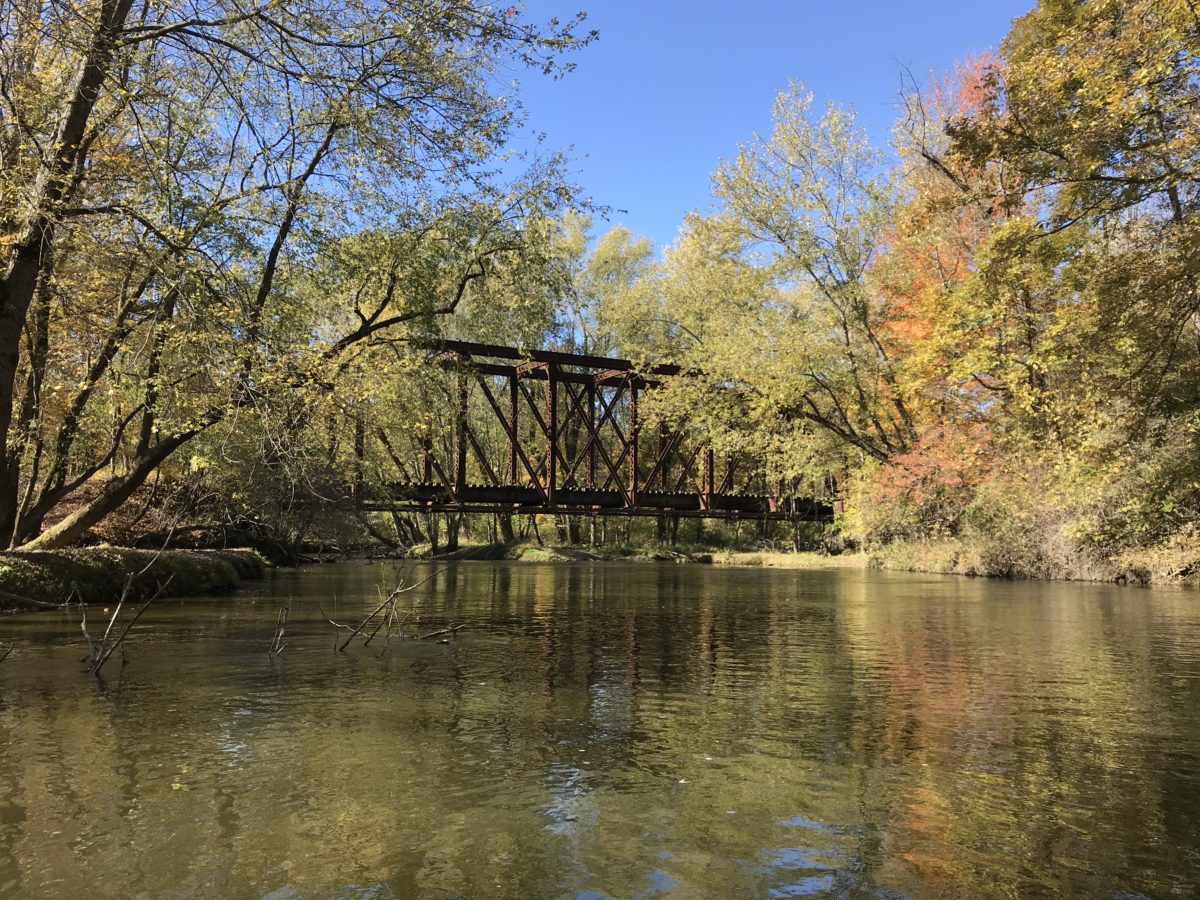
Shoutout to the Shenango
Allegheny Alumna Helps Lead Environmental Effort as the Western Pennsylvania Waterway Wins River of the Year Status in Pennsylvania
The scenic, meandering Shenango River has been selected as Pennsylvania’s River of the Year in 2021, and an Allegheny College alumna and current Penn State staff member leads the group that helped bring that honor to the waterway.
Brandi Baros is a 1995 Allegheny graduate and the president of the Shenango River Watchers. The organization is a nonprofit watershed group formed to restore and protect the environmental, scenic, and recreational attributes of the Shenango River Watershed.

As president, Baros’ primary duties are to be the public voice of the Shenango River Watchers, and oversee board meetings and public meetings. She also leads two committees of the group’s board of directors that oversee maintenance of the 82-mile-long river and a hiking trail that runs along it. The river winds through western Pennsylvania, connecting Pymatuning and Shenango lakes with the Beaver River.
After working on her Ph.D. at the University of Pittsburgh, Baros joined the Shenango River Watchers in 2009, when she moved to Hermitage. “When Shenango River Watchers was founded in 2001, I was in grad school. I probably could have found the Shenango River on a map, but I didn’t know much else about it,” she said. “When I moved to the Shenango Valley, I didn’t expect to find my happy place in the river.”
So what earns a waterway the title of Pennsylvania’s River of the Year?
The public cast more than 16,000 ballots online for the Shenango, choosing from among five waterways nominated across the state. The group received $10,000 for its conservation activities in 2021 from the state’s Department of Conservation and Natural Resources and the Pennsylvania Organization for Waterways and Rivers.
“It’s not so much just the past year, as much as the cumulative accomplishments of the past 20 years,” said Baros. “In that time, we’ve removed over 50,000 tires and 1.5 million pounds of other trash from the river and its surroundings.”
The group also cleared fallen trees from 23 miles of the river to create the Shenango River Water Trail. This is the section of river from Pymatuning Dam to Shenango Lake, and every summer volunteers and hired lumberjacks have cleared downed trees and other obstructions so a paddler can put in at Pymatuning and float to Shenango Lake without having to portage.
“We use environmentally friendly methods to remove downed trees, leaving as much intact as possible at the river’s edge to serve as fish and wildlife habitat while still providing a clear path for paddlers,” said Baros. “Over the past few years we built and now maintain five launch sites along the Water Trail, plus one in downtown Sharon.”
Each year, the Shenango River Watchers hold educational events for children and adults on topics from environmental stewardship to kayaking and fly fishing. The group had to suspend these events for 2020, but in other years it brings students from five school districts to its annual Environmental Education Day at Buhl Park in Hermitage.
“We inherited the Shenango (hiking) Trail a couple years ago from another organization, and now we are working to restore it and make it more accessible, including repairing or replacing some of the old bridges over streams,” said Baros. This trail includes part of the towpath from the old Erie Canal extension along the Shenango. Volunteers also are working to compile the history of the trail.
The Shenango River Watchers has only one paid employee who handles the day-to-day business; the rest are all volunteers, Baros said. The group works closely with partner organizations, especially the Army Corps of Engineers, the Pennsylvania Department of Conservation of Natural Resources, the Pennsylvania Fish and Boat Commission, Tri-County Cleanways, the Mercer County Conservation District, the Pennsylvania Organization for Waterways and Rivers, Trout Unlimited, Buhl Park, and several municipalities including the cities of Sharon and Greenville, said Baros.
The group also works with the U.S. Environmental Protection Agency and the Pennsylvania Department of Environmental Protection, especially with remediation projects they have been overseeing near the old Westinghouse site in Sharon, Baros said.
To celebrate the 2021 River of the Year designation, the group is holding a variety of events this year, including clean-ups, hikes, and paddling events. More information will be on its website and its Facebook page.
Baros invites adventurers to explore some of her favorite areas along the river:
- By kayak or canoe, float the Water Trail. Put in just below Pymatuning Dam, and float as long as you want. It’s about 8 miles, two-and-a-half hours to Greenville, and an all-day 23-mile float to Shenango Lake, and there are five launches Shenango River Watchers maintains from lake to lake. This section of river passes through forest and has a variety of wildlife, especially birds, and offers good fishing, Baros said. There are some short sections of Class 1 rapids, but it’s otherwise a smooth and easy paddle. The group’s Paddle Fest events float the first eight miles of the Water Trail. This year’s events are scheduled for June 19 and Oct. 9.
- Shenango Lake also has inviting areas to kayak/canoe, especially the no-wake zones at the eastern and western ends of the lake, Baros said. Visitors see a fantastic variety of birds, especially kingfishers, bald eagles, golden eagles, ospreys, and a variety of waterfowl. The middle of the lake is open to powered boats, so if you’re a paddler that can make for some rougher water.
- If you prefer to keep your feet on land and like a somewhat rugged hike, the Shenango Trail is a wonderful work in progress. Park your vehicle at New Hamburg and hike south, and you can make a loop of it where the Shenango Trail and the old Towpath Trail meet, and hike back to your car. It’s about 7 miles.
- If you want a paved trail that is more friendly to wheelchairs, strollers, and people with mobility limitations, try the Trout Island Trail, which follows part of the river in Sharpsville. It’s maintained by the Mercer County Trails Association.
For those interested in preserving watersheds in their areas, Baros recommends getting involved in any way you can. “I strongly encourage folks to be good stewards in everyday life,” she said. “If you’re out and about and see litter, pick it up and dispose of it properly. Conserve water in your daily life by using efficient fixtures and appliances, and be very careful about what you put down the drain. Avoid putting pesticides and herbicides onto your lawn or garden, as these will get washed into the waterways. ‘We all live downstream’ is our motto.”
Baros taught biology at Allegheny College from 2002 to 2008. She currently is part of Penn State’s Environmental Health & Safety (EHS) Department, serving as the EHS coordinator for the six western-most of the university’s 21 regional campuses. “I work with people at all levels at my campuses — researchers, instructors, lab technicians, maintenance teams, artists, theater directors, administrators, and students – and assist with everything from chemical and biological hazards to air quality, machinery, and ladders to theatrical rigging.”
She also credits her undergraduate education as providing a responsible worldview.
“Allegheny’s Biology Department gave me an excellent foundation to think about the world around me at every level, from molecules to ecosystems,” Baros said. “The college-wide emphasis on writing and speaking has served me far better than I could ever have expected as a student. Good communication skills are vital no matter what field you’re in. I also learned how important it is to have a network of good friends, because good friends can help you get through just about anything.”